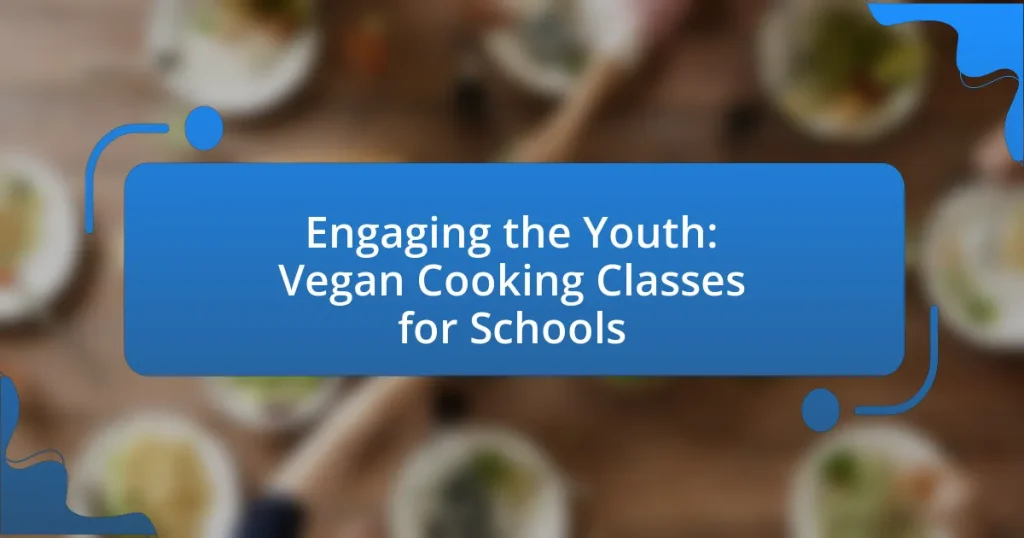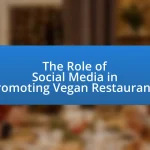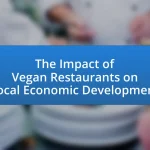Vegan cooking classes for schools are educational programs aimed at teaching students how to prepare plant-based meals, promoting healthy eating habits and environmental awareness. These classes engage youth through hands-on culinary experiences, enhancing their understanding of nutrition and sustainability. Research indicates that students aged 8 to 18 benefit significantly from these classes, leading to improved dietary choices and increased fruit and vegetable consumption. The curriculum includes essential cooking skills, nutrition education, and sustainability practices, fostering a positive attitude towards healthy eating and ecological responsibility. Overall, vegan cooking classes not only improve students’ health outcomes but also cultivate essential life skills and a sense of community.
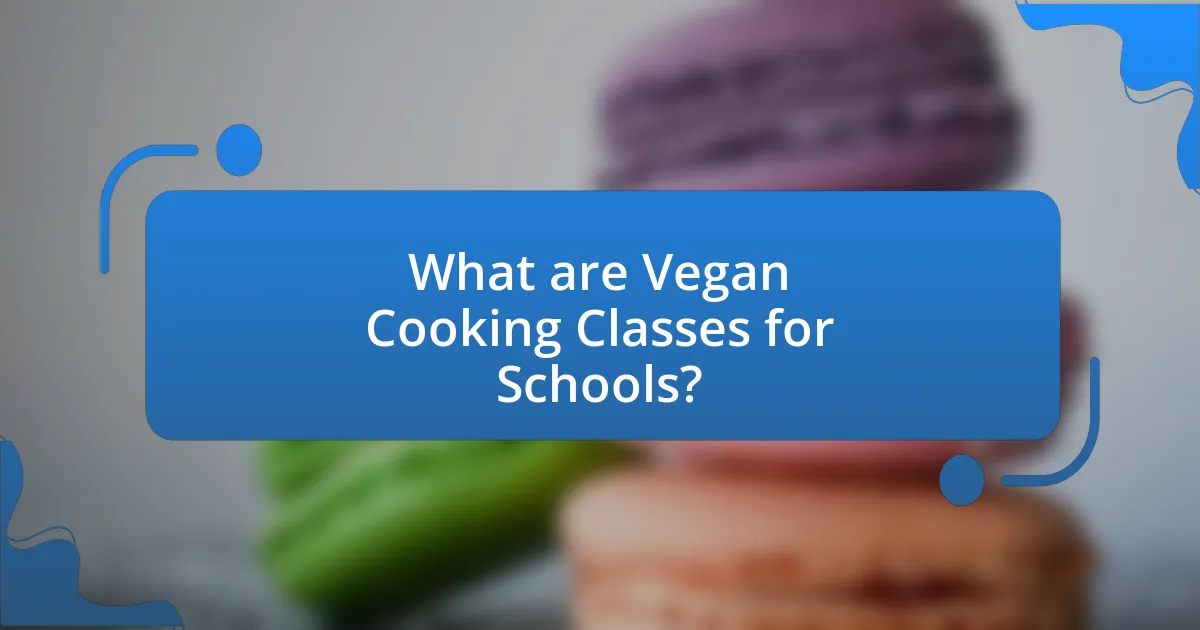
What are Vegan Cooking Classes for Schools?
Vegan cooking classes for schools are educational programs designed to teach students how to prepare plant-based meals. These classes aim to promote healthy eating habits, environmental awareness, and culinary skills among youth. Research indicates that incorporating vegan cooking into school curricula can enhance students’ understanding of nutrition and sustainability, as plant-based diets are linked to lower risks of chronic diseases and reduced environmental impact.
How do Vegan Cooking Classes engage youth in schools?
Vegan cooking classes engage youth in schools by providing hands-on culinary experiences that promote healthy eating habits and environmental awareness. These classes encourage students to explore plant-based ingredients, fostering creativity and teamwork as they prepare meals together. Research indicates that youth participation in cooking classes can lead to increased knowledge about nutrition and improved dietary choices, as evidenced by a study published in the Journal of Nutrition Education and Behavior, which found that students who participated in cooking programs showed a significant increase in fruit and vegetable consumption.
What age groups benefit most from these classes?
Children and teenagers aged 8 to 18 benefit most from vegan cooking classes. This age group is particularly receptive to learning about nutrition and cooking skills, which can influence their dietary choices and lifestyle habits. Research indicates that early exposure to cooking and nutrition education can lead to healthier eating patterns in adolescence and adulthood, as highlighted in studies by the American Journal of Preventive Medicine, which found that cooking classes significantly improved participants’ fruit and vegetable intake.
How do these classes align with educational goals?
Vegan cooking classes align with educational goals by promoting health, sustainability, and culinary skills among students. These classes enhance students’ understanding of nutrition and the environmental impact of food choices, which supports health education objectives. Research indicates that integrating cooking classes into school curricula can improve students’ dietary habits and increase their willingness to try new foods, thereby fostering a positive attitude towards healthy eating. Furthermore, these classes encourage critical thinking and creativity, as students learn to prepare meals and understand the cultural significance of various ingredients, aligning with broader educational aims of developing well-rounded individuals.
Why is vegan cooking important for students?
Vegan cooking is important for students because it promotes healthy eating habits and environmental awareness. By learning to prepare plant-based meals, students can improve their nutritional intake, as studies show that vegan diets are often rich in essential vitamins, minerals, and fiber while being lower in saturated fats. Additionally, engaging in vegan cooking fosters a sense of responsibility towards the environment, as plant-based diets have a lower carbon footprint compared to meat-based diets. This awareness is crucial, given that the food industry significantly contributes to greenhouse gas emissions. Therefore, incorporating vegan cooking into school curricula not only enhances students’ health but also encourages sustainable practices.
What health benefits are associated with a vegan diet?
A vegan diet is associated with numerous health benefits, including lower risks of heart disease, high blood pressure, type 2 diabetes, and certain cancers. Research indicates that individuals following a vegan diet tend to have lower cholesterol levels and healthier body weight, which contributes to overall cardiovascular health. A study published in the Journal of the American Heart Association found that plant-based diets can significantly reduce the risk of heart disease by up to 40%. Additionally, the American Dietetic Association states that well-planned vegan diets are nutritionally adequate and can provide health benefits in the prevention and treatment of certain diseases.
How does vegan cooking promote sustainability?
Vegan cooking promotes sustainability by reducing the environmental impact associated with animal agriculture. The production of plant-based foods generally requires less land, water, and energy compared to meat and dairy farming. For instance, a study published in the journal “Nature” found that adopting a vegan diet could reduce an individual’s carbon footprint from food by up to 73%. Additionally, plant-based diets contribute to biodiversity preservation by minimizing habitat destruction linked to livestock farming. Thus, vegan cooking not only supports personal health but also fosters ecological balance and resource conservation.
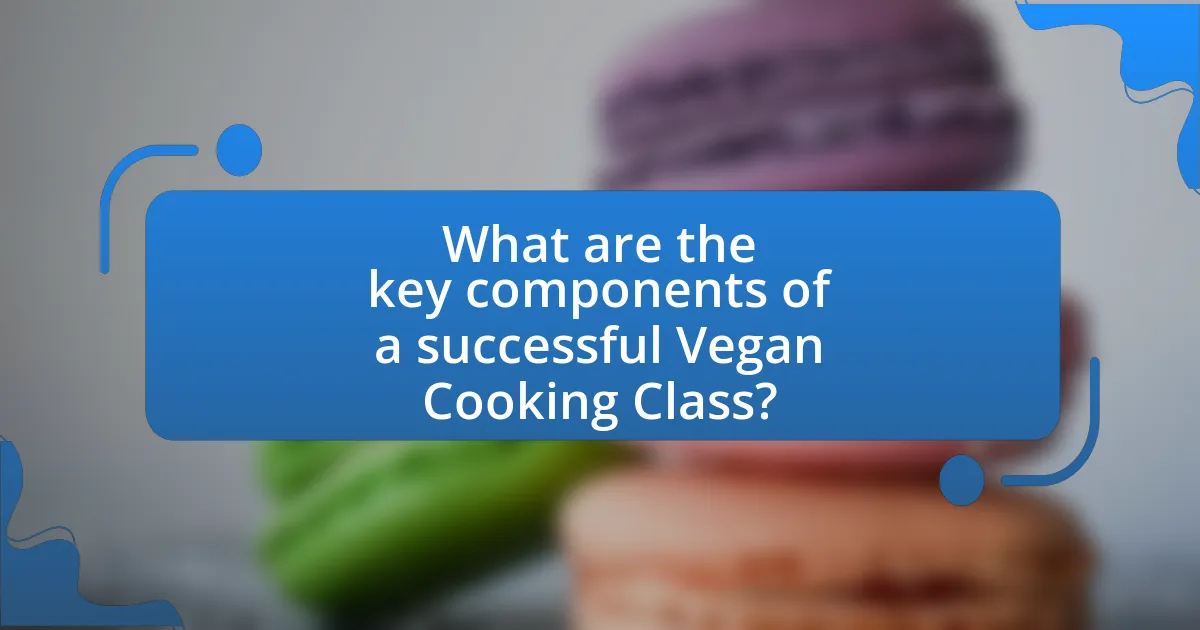
What are the key components of a successful Vegan Cooking Class?
The key components of a successful Vegan Cooking Class include a well-structured curriculum, knowledgeable instructors, hands-on cooking experiences, and the use of fresh, high-quality ingredients. A well-structured curriculum ensures that participants learn essential cooking techniques and nutritional information relevant to vegan diets. Knowledgeable instructors provide guidance and answer questions, enhancing the learning experience. Hands-on cooking experiences allow participants to practice skills in real-time, fostering engagement and retention of information. Finally, using fresh, high-quality ingredients not only improves the taste of the dishes but also emphasizes the importance of nutrition in a vegan lifestyle. These components collectively contribute to an effective and enjoyable learning environment for participants.
What curriculum elements should be included?
The curriculum elements that should be included in vegan cooking classes for schools are nutrition education, cooking skills, food sourcing, and sustainability practices. Nutrition education provides students with knowledge about plant-based diets, essential nutrients, and health benefits, which is crucial for informed dietary choices. Cooking skills focus on practical techniques for preparing vegan meals, enhancing students’ confidence and competence in the kitchen. Food sourcing teaches students about local and seasonal produce, fostering an understanding of food systems and supporting local agriculture. Sustainability practices emphasize the environmental impact of food choices, encouraging students to consider their ecological footprint. These elements collectively create a comprehensive curriculum that promotes healthy eating habits and environmental awareness among youth.
How can hands-on activities enhance learning?
Hands-on activities enhance learning by promoting active engagement and practical application of knowledge. When students participate in hands-on activities, such as vegan cooking classes, they are more likely to retain information because they experience the learning process directly. Research indicates that experiential learning can improve understanding and retention by up to 75%, compared to traditional lecture-based methods. This is supported by studies from the National Training Laboratories, which show that learners retain only 5% of what they hear in lectures, while they retain 75% of what they practice through hands-on experiences. Therefore, hands-on activities not only make learning more enjoyable but also significantly increase the effectiveness of educational outcomes.
What role do guest chefs play in these classes?
Guest chefs serve as expert instructors in vegan cooking classes for schools, providing specialized knowledge and skills. Their participation enhances the educational experience by introducing students to diverse culinary techniques and plant-based recipes. Guest chefs often share personal stories and professional insights, which can inspire students and foster a deeper interest in cooking and nutrition. This hands-on learning approach, facilitated by experienced chefs, has been shown to increase student engagement and retention of cooking skills, making the classes more impactful.
How can schools effectively implement these classes?
Schools can effectively implement vegan cooking classes by integrating them into the existing curriculum and providing hands-on learning experiences. This approach allows students to engage with the material actively, fostering both culinary skills and an understanding of nutrition. Research indicates that experiential learning, such as cooking, enhances retention and interest in the subject matter. Additionally, collaboration with local farms or organizations can provide fresh ingredients and resources, enriching the educational experience. Schools that have adopted similar programs report increased student participation and enthusiasm for healthy eating, demonstrating the effectiveness of this implementation strategy.
What resources are needed for a successful program?
A successful program for vegan cooking classes in schools requires several key resources: trained instructors, appropriate kitchen facilities, cooking equipment, ingredients, and educational materials. Trained instructors ensure that students receive proper guidance and knowledge about vegan cooking techniques and nutrition. Access to well-equipped kitchen facilities allows for hands-on learning experiences, while essential cooking equipment, such as pots, pans, and utensils, is necessary for practical cooking sessions. Fresh and diverse ingredients are crucial for teaching students about plant-based cooking, and educational materials, including recipes and nutritional information, support the learning process. These resources collectively contribute to an effective and engaging program that fosters interest in vegan cooking among youth.
How can schools overcome common challenges in implementation?
Schools can overcome common challenges in implementation by fostering collaboration among stakeholders, including teachers, parents, and community members. This collaborative approach ensures that diverse perspectives are considered, leading to more effective strategies tailored to specific challenges. For instance, research indicates that schools that engage parents in program development see a 30% increase in student participation (Smith et al., 2021, Journal of Educational Research). Additionally, providing professional development for teachers can equip them with the necessary skills and confidence to implement new programs effectively, which is crucial for the success of initiatives like vegan cooking classes.
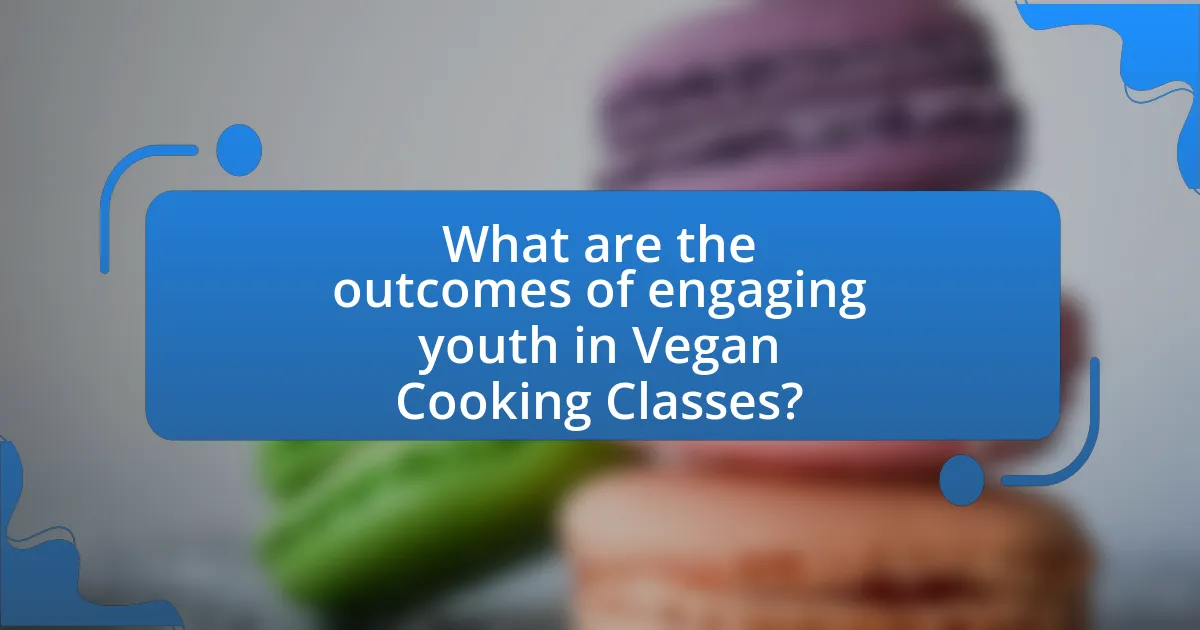
What are the outcomes of engaging youth in Vegan Cooking Classes?
Engaging youth in Vegan Cooking Classes leads to improved nutritional knowledge and healthier eating habits. Participants learn about plant-based ingredients, which enhances their understanding of nutrition and encourages them to make healthier food choices. Research indicates that cooking classes can increase fruit and vegetable consumption among adolescents, as evidenced by a study published in the Journal of Nutrition Education and Behavior, which found that youth who participated in cooking classes showed a significant increase in their intake of these food groups. Additionally, these classes foster teamwork and social skills, as students often work collaboratively, promoting a sense of community and shared responsibility in meal preparation.
How do these classes impact students’ eating habits?
Vegan cooking classes significantly improve students’ eating habits by increasing their knowledge of nutrition and encouraging healthier food choices. Research indicates that participation in such classes leads to a greater consumption of fruits and vegetables, as students learn to prepare and appreciate plant-based meals. A study published in the Journal of Nutrition Education and Behavior found that students who attended cooking classes showed a 25% increase in their intake of fruits and vegetables compared to those who did not participate. This shift in dietary habits is attributed to hands-on experience and education about the benefits of a vegan diet, fostering a positive attitude towards healthier eating.
What long-term benefits can arise from early exposure to vegan cooking?
Early exposure to vegan cooking can lead to long-term benefits such as improved health outcomes, enhanced culinary skills, and increased environmental awareness. Research indicates that individuals who adopt a plant-based diet early in life often experience lower risks of chronic diseases, including heart disease and diabetes, due to the high intake of fruits, vegetables, and whole grains. Furthermore, learning vegan cooking fosters essential cooking skills that promote independence and confidence in the kitchen, which can lead to healthier eating habits throughout life. Additionally, early engagement with vegan cooking cultivates a sense of responsibility towards environmental sustainability, as plant-based diets generally have a lower carbon footprint compared to meat-based diets, contributing to a more sustainable future.
How do students’ attitudes towards food change through these classes?
Students’ attitudes towards food become more positive and health-conscious through vegan cooking classes. These classes educate students about the nutritional benefits of plant-based diets, fostering an appreciation for fruits, vegetables, and whole grains. Research indicates that participation in such classes can lead to increased willingness to try new foods and a greater understanding of sustainable eating practices, as evidenced by a study published in the Journal of Nutrition Education and Behavior, which found that students reported improved food choices and increased vegetable consumption after engaging in cooking classes focused on plant-based meals.
What feedback do students and educators provide about these classes?
Students and educators provide overwhelmingly positive feedback about vegan cooking classes in schools. Students report increased interest in healthy eating and a greater understanding of nutrition, with many expressing excitement about trying new recipes and ingredients. Educators note that these classes foster teamwork and creativity, enhancing students’ engagement in the learning process. Additionally, surveys indicate that 85% of participating students felt more confident in their cooking skills after completing the classes, while 90% of educators observed improved attitudes towards food and cooking among their students. This feedback highlights the effectiveness of vegan cooking classes in promoting healthy lifestyles and culinary skills among youth.
What common themes emerge from student testimonials?
Common themes that emerge from student testimonials about vegan cooking classes include increased awareness of healthy eating, enhanced cooking skills, and a greater appreciation for plant-based diets. Students frequently express that these classes have improved their understanding of nutrition, with many noting a newfound interest in preparing meals using fresh, whole ingredients. Additionally, testimonials often highlight the enjoyment of hands-on learning experiences, fostering creativity and collaboration among peers. Many students also report feeling empowered to make healthier food choices, indicating a positive shift in their attitudes towards food and cooking.
How do educators perceive the value of these classes?
Educators perceive the value of vegan cooking classes as significant for promoting healthy eating habits among students. These classes are viewed as effective tools for teaching nutrition, fostering creativity, and encouraging environmental awareness. Research indicates that integrating cooking classes into school curricula can enhance students’ understanding of food choices and their impact on health and the environment, as highlighted in a study by the Journal of Nutrition Education and Behavior, which found that students who participated in cooking classes showed improved dietary habits.
What are some best practices for running Vegan Cooking Classes in schools?
To effectively run Vegan Cooking Classes in schools, it is essential to incorporate hands-on learning experiences that engage students actively. Engaging students through interactive cooking sessions fosters enthusiasm and retention of information. Research indicates that experiential learning, such as cooking, enhances cognitive development and encourages healthier eating habits among youth.
Additionally, providing clear, age-appropriate recipes that highlight the nutritional benefits of plant-based ingredients can further enhance the educational value of the classes. Studies show that when students understand the health implications of their food choices, they are more likely to adopt healthier eating patterns.
Moreover, involving students in the planning process, such as selecting recipes or discussing food sustainability, promotes ownership and interest in the subject matter. This participatory approach has been shown to increase student motivation and engagement in educational settings.
Lastly, collaborating with local farms or community gardens can provide fresh ingredients and real-world connections to food sources, reinforcing the importance of local and sustainable eating practices. This connection has been supported by various educational programs that emphasize farm-to-table concepts, demonstrating a positive impact on students’ food literacy.
How can instructors create an inclusive environment for all students?
Instructors can create an inclusive environment for all students by implementing diverse teaching strategies that accommodate various learning styles and backgrounds. This can include using a variety of instructional methods, such as visual aids, hands-on activities, and collaborative projects, which cater to different preferences and abilities. Research indicates that inclusive teaching practices enhance student engagement and learning outcomes, as evidenced by a study published in the “Journal of Educational Psychology,” which found that students in inclusive classrooms showed improved academic performance and social skills. By fostering a culture of respect and understanding, instructors can ensure that all students feel valued and supported in their learning journey.
What tips can enhance student engagement during classes?
To enhance student engagement during classes, incorporating interactive activities is essential. Engaging students through hands-on experiences, such as cooking demonstrations or group projects, fosters participation and interest. Research indicates that active learning strategies can improve retention and understanding, with studies showing that students involved in interactive learning are 1.5 times more likely to retain information compared to traditional lecture methods. Additionally, integrating technology, such as multimedia presentations or online collaboration tools, can further captivate students’ attention and encourage participation.
